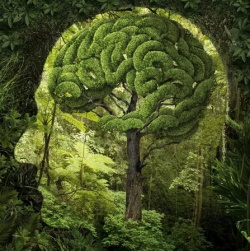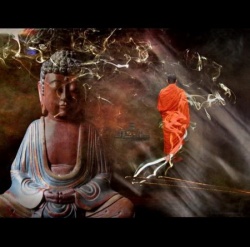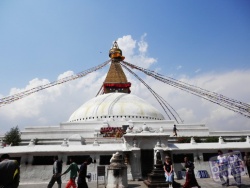Padma Neuroses (Longing, Obsession, Manipulation)
In the process of Shamata meditation, we are involved in 2 things. The first is trying to experience our energy, our aliveness, and awareness without agitation. The second is trying to experience stillness, quiet, and peace, without becoming dull. A lot of our tendency to become agitated or dull comes from our desire or longing to be somewhere else and our inability to stay satisfied with our current situation or activity.
This longing is part of Padma energy. It is especially visible in younger people who crave excitement and action and are less comfortable being still, quiet, and reflective than older people. There may be more of a tendency in older people to dullness and to falling asleep, but there can still be a tendency to over-think things instead of just experiencing them. There may also be some inflexability resulting from firmly held views of how things ought to be or how we want things to be.
Our current Realm is called the Realm of Desire in Buddhism. This means that we have a close relationship with Padma neuroses. It starts with a desire for fulfillment and a sense of wholeness, from which comes a desire for unity. this then leads to desire for pleasant sights, sounds, smells, tastes, touches, and ideas. It is in trying to accomplish this sense of wholeness that we get into trouble with Padma energy.
You will note from looking at the 5 Wisdom families that analysis and differentiation is in the Vajra Family. What this means for Padma energy is that, first, we are attracted to outside objects or situations and only afterwards do we analyze them. This is one other way in which we can get into trouble with Padma energy.
It often happens that, in certain circumstances, we don't always move on to the step of analyzing the benefit or harm. Because of this, we can end up attracted to, longing for, and indulging in things and situations that are actually harmful to ourselves or others.
This can be anything from smoking cigarettes, even though they are proven to cause cancer, or having that second bowl of ice cream up to narcotics abuse, or continually being attracted to abusive relationships. It is part of why it is so hard to eliminate our bad habits. There is a disconnect between our attraction to something, and our realization that it could be harmful. This is all because the attraction not only comes first but can be very intense. It's like the difference between the hunger that we have as we smell food being prepared and the feeling of satisfaction after the meal. The feeling of satisfaction is comfortable, but the hunger at the beginning of the meal is a much more intense feeling. It is designed to be strong enough to get our attention.
On top of that, because Padma energy is about the initial attraction and perception of desirability, we can end up in a cycle of repeated consumption. This is because we are trying to be satisfied (Ratna energy), but, again, we are not moving far enough past the energy of attraction and desire and its initial resolution to really measure whether the object of our desire is really providing the type of satisfaction that we're looking for.
The classic example is drinking salt water. Even though it can't quench our thirst, the thirst itself compells us to drink more, which makes us more thirsty. This way we are kept in a constant state of dissatisfaction and longing.
Buddhist teachings talk about the realm of the hungry ghosts where beings have large bellies, but tiny necks and mouths. Because of this, they either can't swallow food, or have a hard time doing so. The result is that they are constantly hungry and can never get enough and constantly move from desirable object to desirable object , never finding satisfaction. I think we have all been in that type of situation before at some point in our lives.
The perfect example of the human neurotic relationship with Padma energy, for me, is the flower shop. We so desire to posess the beauty of a flower that we cut off the flower from the plant in order to take it home. In the process, we guarantee that the beauty will fade as the flower dies. If we had left it alive, we might be able to see the beauty over and over again, but we are so attached to posessing its beauty that we're willing to take its life in order to satisfy our own desires.
We are often faced with the choice of achieving our desires at the expense of someone else. Because we want something so much, we can exploit, lie, cheat, steal, deceive, mislead, and verbally or physically abuse others. Desire for land, wealth, power, or control can even lead us to think that killing another being is a worthy thing to do. We can easily end up thinking that fulfilling our desires is more important than the existence, happiness, or well-being of other sentient beings.
This includes the automatic killing of insects just because they are in our house, or we don't like the way they look as well as ignoring the feelings of others when we do something to get what we want. We can even fail to recognize their humanity, treating them like animals or worse, merely in order to achieve our own wealth at their expense. All of this comes from our ignorance of how important the way that we treat others is and how our attitude towards others and the way we treat them determines our future circumstances.
On the other side, if we feel a lack of relationship or attraction and grasp at that, we can become obsessive, sentimental, and full of longing. We can have a sense of isolation and separation, combined with a longing for relationship.
This comes about because we haven't been trained to recognize the signs of our interconnection with others. We are taught to be competitive, independent and individualistic and so we lose sight of the degree of co-operation, interdependence, and community, that is required even for very basic survival. The result is that we can have an exaggerated sense of separateness, aloneness, and independence. This merely serves to intensify our isolation and its resulting sadness.
The way most people relate to sadness is a good example of the misuse of Padma energy. We can be sad because of feelings of isolation and aloneness. We can feel sadness because of the demands of others or sadness over the things we need to do in order to get another object of desire. We can feel sadness for our own misfortune or feel sadness at the plight or suffering of others and as a result can become depressed, and give up hope and become inactive.
We forget that the sadness is temporary and merely a sensation relating to the quality of the particular situation or relationship that we are focussing on. The situation or problem is also not permanent, or fixed and unchangeable, and we forget that. Sadness is a recognition of loss or problems. It is usually only related to one part of our lives and a temporary part at that.
The other side is that we try to avoid any signs of sadness through all sorts of distractions and entertainment as a substitute in order to try to avoid the dangers of working on our desires and not achieving those desires or not being able to hold on to the desired objects, people or situations once we've succeeded. Again this comes from a failure to recognize that we can only obtain something once the appropriate causes and conditions have been created.
If we are feeling lonely, we cannot eliminate that feeling by stayin in our rooms. We need to get out and meet people and engage with them in order to eliminate our loneliness. We need to go outside and walk in nature and regain our sense of connection with the world around us. We are constantly failing to recognize that everything that is created is, by nature, impermanent and incapable of lasting forever. We also forget that, with each disappearance, something new is created in its place.
We may recognize in the process of working with relationships that part of the beauty is in being able to create good relationships even though they are only temporary. We become like an master artist or, better yet, a musician in an orchestra. We create a piece of beautiful music which lasts for a certain period and then is over, but the quality of the music is a reflection of our own skill and the beauty and harmony of working together with our fellow musicians. We create the masterpiece and then give it away, revelling in the beauty of what has just passed and improving and fulfilling ourselves in the process.
There is also an aspect of the attraction and desire of Padma energy where we are preoccupied with our desires and use our ability to attract and manipulate people and the world around us for our own selfish ends.
In this process of attraction, appreciation and creation of relationships, we can learn about and become skilled at knowing what we need to say and do to attract different situations or people to our side. We have the ability to then detach ourselves from the emotional effects that our magnetism has on others and then ignore the well-being or consequenses for the situation or other person and focus solely on achieving our own desires.
We can let this ability to attract people and situations to us get to our heads. The result is that we can become manipulative and use and enhance our charisma in order to satisfy our self-interests. We become fascinated by our own ability and the power that we have over others as a result. It's in the process of this fascination that we lose track of whether what we're doing is beneficial or harmful to the people or situation that we're dealing with.
A lot of our current salesmanship or political campaigns operate this way. We try all sorts of tricks to attract buyers to our product and then we exagerate certain aspects of our image or create an over-exagerated view of the benefits of our product in order to entice others to buy it. Included in that is a set of misleading and complicated group of promises or features with questionable accuracy.
When we try to fight or resist Padma energy, we can become cold and uncommunicative. We are afraid of the whole idea of unity and feel overly exposed and vulnerable, and so run in the other direction. We will be shy and introverted, afraid of social and emotional situations altogether. This comes from our false belief that we are separate and independent. We are always completely interconnected, but lack of awareness of this interconnection has resulted in our feeling uncomfortable with any sign of unity.
The other way to react is that we can become demanding and try to control the situation so that no room is left for the other person to participate in the relationship. As long as we're in control, we can manage the relationship without feeling vulnerable. Of course, the problem is that, if we work in this way, then we're not really in a relationship, because everything is coming mostly from one side and it takes two sides to make up any sort of real relationship work.
Being overwhelmed by Padma energy, we will become depressed and sad or full of longing and emotionality. We will be totally confused by relationships and too afraid of getting involved in relationships. We get caught between the need for relationship and our inability to work with the reality of exchange that must occur in these relationships. This again comes from not learning about all of the relationships that we depend upon for our very existence, and the fear of being open to others from lack of confidence in being able to find relationships that will not harm us.
A lot of this comes from not often experiencing the ability to trust or not often having a feeling of safety in our relationships with others.




